 zachary harden
zachary harden
Keywords: lithuania |
Links: FOTW homepage | search | disclaimer and copyright | write us | mirrors

Last modified: 2024-07-27 by  zachary harden
zachary harden
Keywords: lithuania |
Links: FOTW homepage |
search |
disclaimer and copyright |
write us |
mirrors
See also:
 image by Tomislav Todorović, 29 April 2013
image by Tomislav Todorović, 29 April 2013
Christian Party (Krikščionių partija) was founded in 2010 by
merger of the Christian Conservative Social Union (Krikščionių konservatorių
socialinė sąjunga) and the Lithuanian Christian
Democratic Party (Lietuvos krikščioniškosios demokratijos
partija) [1]. Its flag consists of two horizontal fields, green
occupying upper two thirds and blue occupying the bottom third of the
flag width, and is charged with a stylized tree on green and the party
name, inscribed in two rows, on blue field, all charges in white [2,
3, 4]. The same design, in form of a rounded square, serves as the
party logo [3], although there is an alternative version of this, with
the green tree and blue inscriptions on white field [5].
Sources:
[1] Christian Party
at Wikipedia:
[2]
Photo of party flag at Facebook:
[3]
Photo of party flag, in front of a car decorated with party logo,
at Facebook:
[4]
Photo of party flag at Facebook:
[5]
Photo of a stage, decorated with the alternative version of party
logo, at Facebook:
Image of flag, created as a modification of
the SVG image of
party logo from Wikipedia:
Tomislav Todorović, 29 April 2013
In 2013, the party merged into the Labour Party and its flag went out of use.
Tomislav Todorovic, 23 March 2024
Front Party (Lithuanian: Fronto partija), usually abbreviated to the Front
(Lithuanian: Frontas), was a Socialist party in Lithuania. It was founded in
2008, and merged with the Lithuanian Socialist Party in 2009
to form the Socialist People's Front [1]. Its flag was dark red, with a black
howling wolf in center, which was holding a yellow shield charged with black
Columns of Gediminas symbol; beneath this, word FRONTAS was inscribed in
yellow [2, 3, 4]. The wolf is actually the Iron Wolf from the medieval legend of
the founding of Vilnius, which appeared in Grand Duke Gediminas' dream as the
sign from the Lithuanian gods (the Lithuanians were still pagans then) that a
city shall be built at the place where he was sleeping during the dream [5]. The
flag design is rather unusual for a leftist party, because legend of the Iron
Wolf actually became popular with the awakening of Lithuanian nationalism, and
there was also a Fascist organization named Iron Wolf which operated in pre-1941
Lithuania, so the use of such a flag would be expected by the ultra-rightists
rather than the leftists. Regardless of that, use of word FRONTAS on the flag
might have inspired the design of one of flags currently used by the
Socialist People's Front.
Sources:
[1] Wikipedia page about the
Front Party
[2] Socialist People's Front website - a
photo of
the Front Party flag
[3] Fotodiena website - a photo of the Front Party flag:
[4] Fotobankas.lt website -
photo of the stage for the Front Party
rally, decorated with the flag charges (yellow color replaced with white)
[5] Wikipedia page about the legend of the Iron Wolf:
Tomislav Todorović, 13 April 2012
 image by Tomislav Todorović, 29 December 2012
image by Tomislav Todorović, 29 December 2012
Homeland Union - Lithuanian Christian Democrats (Tėvynės sąjunga - Lietuvos
krikščionys demokratai) was founded in 1993 as the Homeland Union (Tėvynės
sąjunga) and present name was adopted in 2008 after the merger with the
Lithuanian Christian Democrats (Lietuvos krikščionys demokratai). It is a
party of moderate right, which is a member of the European People's Party and
the International Democrat Union. Party flag is white, with large representation
of the party logo in center. The logo consists of two blue shapes which together
outline a white heart, party name abbreviation also in blue, and a green
swallow. While the color shades vary somewhat on the photos of flag and logo
which are available on the Web, it is clear that green is visibly lighter than
on Lithuanian national flag and that blue is rather dark.
Sources:
[1]
Wikipedia page about the party
[2]
Party profile at the Facebook - photo of party flag (Image)
[3]
Respublika.lt website - photo of party flag (Image)
Image of flag derived from the Wikipedia
image of
party logo.
Tomislav Todorović, 29 December 2012
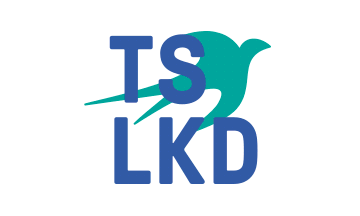
image by
Tomislav Todorovic, 23 March 2024
In 2020, the old logo, with the last recorded use in 2019 [1], was replaced with a new one [2], with the first recorded online appearance on 2020-06-05 [3]: the initials TS and LKD, in a much darker shade of blue, are inscribed in two rows and superimposed over the swallow, which is now in a bluish green color. The party flag was modified accordingly, now displaying the new logo, larger than the old one, on the white field [4, 5, 6, 7].
 image by Tomislav Todorović, 16 April 2012
image by Tomislav Todorović, 16 April 2012
Labour Party (Lithuanian: Darbo partija) is a centrist political party
which was founded in 2003 and is a member of the European Democratic
Party. Its flag is white with the party logo, a white rising sun on a
blue wide arrow-shape and the party name, also in blue, inscribed
beneath in two rows. Its photos
can be seen in the photo gallery at the
party website.
The shade of blue seems to vary a bit, but comparing with the flag of
European Union, which was also photographed at some of these events,
seems to reveal that the shade is either the same or very similar on
both flags. (This is why the attached image shows the same shade of
blue as used for the image of EU flag.)
The attached image was created by using the SVG image of the
party
logo from Wikipedia.
Tomislav Todorović, 16 April 2012
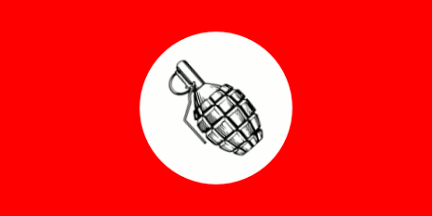 image by Tomislav Todorović, 12 May 2012
image by Tomislav Todorović, 12 May 2012Considering the image
name, this was probably meant to be "Lithuanian National Bolshevik
Party". In my opinion, this image is certainly an error, because the
flag is too similar to that of the "Latgalian National-Bolshevik
Republic", whose image
is shown here.
In fact, this "Lithuanian" flag is identical to the original version
of the Latvian flag image (later repainted to match the real colors).
It seems that there was a confusion involving Latvian and Lithuanian
flags, the same flag having been attributed to the National Bolsheviks
from both countries. Even if that flag was seen in Lithuania, still it
doesn't mean that it was Lithuanian - it could have easily been
brought there by the National Bolsheviks from Latvia who came to join
their Lithuanian comrades for a rally.
On the other hand, there is a
different flag which was indeed used by the Lithuanian National Bolshevik Party,
which uses red flag charged with a
hand grenade drawn in black and placed in center of a white disc. Such
flag was seen in the city of Klaipeda on 2006-04-29 [1] and 2006-08-18
[2], during the protests against the closing down of Russian-language
schools in Lithuania (28% citizens of Klaipeda are Russians - the
greatest Russian population in Lithuania - and there is also the only
Russian-language secondary school in the country). The photo from the
first of these events also shows that the armbands worn by the party
activists repeat the flag pattern [1]. The usual National Bolshevik
flags and armbands with the hammer and sickle are probably not used at
all, because that symbol is banned in Lithuania. These are the only
reports about the Lithuanian National Bolshevik flag that can be found
on the Web, and there are generally very few reports about the party,
so that it is actually not known whether the party still operates at
all - not only that the Russian population in Lithuania is very small
(much smaller than in other Baltic countries), but the National
Bolshevism seem to have never been very popular there, the Russians in
Lithuania usually preferring less extreme political options.
Sources:
[1] National Bolshevik Party of Russia website -
article about the protests in
Klaipeda on 2006-04-29
[2] National Bolshevik Party of Russia website -
article about the protests in
Klaipeda on 2006-08-18
Tomislav Todorović, 12 May 2012
See also: National Bolshevik Party (Russia) and "Flag of Latgalian National-Bolshevik Republic, 2005"
Previously Reported (possibly wrong) Flag
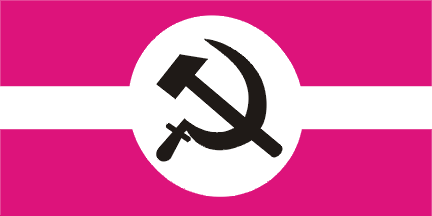 image by (anon.), 29 April 2003
image by (anon.), 29 April 2003
 image by Anon., 26 August 2003
and Tomislav Todorovic, 18 May 2024
image by Anon., 26 August 2003
and Tomislav Todorovic, 18 May 2024
.gif) image by
Anon., 26 August 2003 and Tomislav Todorovic, 18 May 2024
image by
Anon., 26 August 2003 and Tomislav Todorovic, 18 May 2024
Emblem
Information received from from Mr. M. Kundrotas, chairman of
the League of the Lithuanian National Youth (Lietuviu tautinio
jaunimo lyga - <tautinelyga.dokeda.lt>):
The emblem of the League of the Lithuanian National Youth - The
black shield is charged with three red bands. It symbolizes two
conective aspects of Nation - the blood and the earth. There is
two national flags of Lithuania Major and Lithuania Minor on top.
White circle with three flames symbolizes the originality and the
concurrent of three ethnic and historic parts of Lithuania -
Lithuania Minor, Lithuania Major and Samogitia (equivalent in
Poland: Great Poland, Little Poland, and Mazovia). This symbol
was published for the first time in the press of Lithuania Minor
on the junction of 19th and 20th centuries. White circle
symbolizes continued perfection (circle), light (white color) and
Baltic culture.
The flag of the League of the Lithuanian National Youth - The
flag has same motive just the shield is replaced with cross and
circle. This is an oldest ornament in the world. It means harmony
of difference in movement: the cross passes into circle through
swastika.
Anon., 26 August and 6 October 2003
 image located by Esteban Rivera, 01 April 2015
image located by Esteban Rivera, 01 April 2015
Here's a better
image for the Lithuanian National Youth.
Source:
http://defendinghistory.com/the-lingering-legacy-of-nazism-in-english/30815
Esteban Rivera, 01 April 2015
The full name of the organization is Lithuanian National Youth Union (Lietuvių
tautinio jaunimo sąjunga). The description of its emblem, as well as photos
of its flag, can be found at
http://tautosjaunimas.lt.
More photos of the flag can be found at:
http://tautosjaunimas.lt/2016/02/08/prasmingas-penktadienio-vakaras-pasvalyje/
http://tautosjaunimas.lt/2011/06/18/lietuviu-tautinio-jaunimo-sajunga-paminejo-1940-metu-netektis/
https://www.15min.lt/ikrauk/naujiena/as-manau/lietuviu-tautinio-jaunimo-sajunga-apie-savo-ideologija-516-253679
http://alkas.lt/2011/11/21/lietuviu-tautinio-jaunimo-sajunga-paminejo-savo-desimtmeti/
Tomislav Todorovic, 6 August 2017
 image by Tomislav Todorović, 14 April 2012
image by Tomislav Todorović, 14 April 2012
Lithuanian Peasant Popular Union (Lithuanian: Lietuvos valstiečių liaudininkų sąjunga) is a centrist political party. It was founded in 2001 as the Peasant and New Democracy Parties' Union (Lithuanian: Valstiečių ir Naujosios demokratijos partijų sąjunga), by merger of Lithuanian Peasant Party (Lithuanian: Lietuvos valstiečių partija), which was founded in 1990, and New Democracy Party (Lithuanian: Naujosios demokratijos partija, which was founded in 1993 as the Lithuanian Women's Party (Lithuanian: Lietuvos Moterų Partija), renamed in 1998 into the New Democracy - Women's Party (Lithuanian: Naujoji demokratija - Moterų partija) and adopted its eventual name in 2000. The party and both of its predecessors were able to gain elected representation in all parliamentary elections in Lithuania since 1996 until present.
The party flag is the green-white-green unequal vertical triband with the party logo
in center and bicolor fimbriations between green and white fields. The
fimbriations are white next to the green fields and dark red next to the white
field. The logo consists of a green emblem, which resembles a stylized tree
issuant from a wheel, and party name initials inscribed below in dark red. The
photos which give the best view of the flag can be found at the party
website (Image
and at the Google+
photo galleries (Image
1,
Image 2)
The described flag image is
derived from the image (CDR format) of the party logo available for free
download at the
party website
2012 name and symbols change
In 2012, the party was renamed again into the Lithuanian Peasant and Greens
Union (Lithuanian: Lietuvos valstiečių ir žaliųjų sąjunga). A new logo was
adopted as well, which shows white silhouette of a bird (most probably the
stork) over the map of Lithuania in green and also includes the new party name
in green. However, no new flag design was seen on the photos so far.
Tomislav Todorović, 14 April 2012
I just found out that my today's contribution about the flag of Lithuanian
Peasant Popular Union is missing an important info - that the party, while
having been founded as the Peasants and New Democratic Party Union, adopted the
name under which I described it in 2006. Consequently, that is the earliest
possible time of the adoption of the described flag.
Tomislav Todorović, 14 April 2012
 image by Tomislav Todorović, 1 August 2017
image by Tomislav Todorović, 1 August 2017
According to the Statutes of the Lithuanian Peasant and Greens Union:
http://www.lvzs.lt/lt/index.php?option=com_content&view=article&id=66&Itemid=41,
Article 1.6, the bird depicted in the party logo is indeed a stork. The
promotional campaigns of the party often include performers costumed as the
storks, as shown in two photo galleries at the party
website, available here:
http://www.lvzs.lt/ and here:
http://www.lvzs.lt/lt/. The new party flags are also shown in those photos.
They have the ratio of about 5:4 (height greater than width) and display the new
logo above the party name inscribed in two rows, on white field.
Close-up
photos of the flag can also be seen here:
http://lzinios.lt and here:
https://www.tv3.lt. While this logo design is the only one which appears on
the flags, other designs also exist. They are all available for free download
from the party website:
http://www.lvzs.lt/. The CMYK values for the shades of green which appear on
the flag are 100-0-100-0 for the map and 92-49-95-18 for the inscription.
Tomislav Todorovic, 1 August 2017
 image by Tomislav Todorović, 13 April 2012
image by Tomislav Todorović, 13 April 2012
Lithuanian Socialist Party (Lithuanian: Lietuvos socialistų partija) was a Marxist political party founded
in 1994, which in 2009 merged with the Front Party to form the
Socialist People's Front [1]. Its flag, as described in the Article 3
of the party Statute [2], was red, charged with the party name
abbreviation LSP in yellow. The animated image of the flag, which is
shown on all the pages of the party website [2] (and reproduced at the
Wikipedia [1]), is currently the only source for its design and the
image was modelled after it. The design of the party flag has probably
inspired the various flags of its successor, the Socialist People's
Front.
Sources:
[1] Wikipedia page
about the Lithuanian Socialist Party
[2] Lithuanian Socialist Party website - party Statute
Tomislav Todorović, 13 April 2012
I located the flag of the
New Union (Social Liberals) - Naujoji Sąjunga (Socialliberalai) at <www.nsajunga.lt>.
Anon., 24 November 2003
 image by Jakub Grombíř, 30 September 2011
image by Jakub Grombíř, 30 September 2011
Here is one new flag of Lithuanian politic party. Tvarka ir teisingumas (it
means "Order and Justice") was established at 2002 as Liberal Democratic Party,
from 2006 it has present name. It is centrist party with rather populist and
eurosceptic rhetoric. Really, it is personalist entity of former president
Rolandas Paksas (by the way, it has biggest support in Samogitia, native region
of Paksas). Flag is blue with golden eagle, four stars and letters LD (for
Liberal Democracy, later replaced with TT - because of new name).
Jakub Grombíř, 30 September 2011
 image by Tomislav Todorovic, 6 August 2018
image by Tomislav Todorovic, 6 August 2018
Photos of current flag (logo with the current initials) can be found at
http://ttsenamiestis.blogspot.rs,
http://www.ttseskine.lt,
http://www.tvarka.rokiskyje.lt/ and
http://www.tvarka.rokiskyje.lt.
Tomislav Todorovic, 6
August 2018
In 2020, the party merged with the Lithuanian Freedom Union
to form the Freedom and
Justice party, which terminated the use of its flag.
Tomislav Todorovic, 23 March 2024
 image by Tomislav Todorović, 13 April 2012
image by Tomislav Todorović, 13 April 2012
Flag with the full party name
 image by Tomislav Todorović, 13 April 2012
image by Tomislav Todorović, 13 April 2012
Flag with the "semi-abbreviation"
 image by Tomislav Todorović, 13 April 2012
image by Tomislav Todorović, 13 April 2012
Flag with the abbreviation SLF
 image by Tomislav Todorović, 13 April 2012
image by Tomislav Todorović, 13 April 2012
Flag with the word FRONTAS
Socialist People's Front (Lithuanian: Socialistinis liaudies frontas)
was founded in Vilnius in 2009 by merger of two leftist parties, the
Front Party and the Lithuanian Socialist Party [1]. The party uses red
flags with various inscriptions in white. On one of them, the full
name of the party is incribed in two rows, letter size adjusted so
that both rows have the same length [2, 3]. Another flag is charged
with the "semi-abbreviation" SL FRONTAS, inscribed in two rows [4, 5,
6]. The typeface used on these two flags is Bookman Old Style. On the
third flag, the inscription is the party name abbreviation SLF and the
typeface is Century Gothic or very similar [2, 3, 4, 6]. The fouth
variant has the word FRONTAS inscribed an a rather "angled" typeface
named Macadamia, although some of the letters appear rather "rounded"
on the flags [2, 3, 4, 5, 6, 7]; the reason for this modification is
unknown, however the party does use the word FRONTAS, with all the
letters inscribed properly, as a kind of logo [8, 9, 10], which is why
the flag is shown here with no "roundings" on the letters. The general
design of all these flags was probably inspired by that of the flag of
Lithuanian Sociaist Party, which had the party name abbreviation
inscribed in white on red field (see below), but the flag with the
word FRONTAS ("Front") might have also been inspired by the flag of
the Front Party (see below).
Sources:
[1] Wikipedia page
about the Socialist People's Front
[2] Party website
- demonstrations on 2010-05-01
[3] Alternative party website -
photo
gallery from demonstrations in
Vilnius on 2012-03-28
[4] Party
website - rally on 2010-07-12
[5] Party website - protests before the Estonian embassy in Vilnius on
2010-04-21
[6] Alternative party website -
photo gallery from demonstrations in
Vilnius on 2011-10-15
[7] Party website - a text illustrated with the
photo of the party
flag with the word FRONTAS
[8] Party website - a text illustrated with the
image of word FRONTAS
inscribed properly
[9] Party website - a text illustrated with the
photo showing the
word FRONTAS inscribed properly
[10] Party website - a text illustrated with the
photo showing the
word FRONTAS inscribed properly
Tomislav Todorović, 13 April 2012
 image
by Tomislav Todorović, 30 July 2017
image
by Tomislav Todorović, 30 July 2017
Introduction
The Way of Courage (Lithuanian: Drąsos
Kelias) is a populist political party in Lithuania with an anti-corruption
platform. It was founded in 2012 by supporters of Drąsius Kedys, of Garliava,
Kaunas County, who had claimed since 2008 that a ring of pedophiles, whose
victim was his daughter, was protected from the legal action by justice
officials, to be forced into hiding himself after two of the persons he was
accusing were murdered the next year. Kedys was found dead in 2010 under unclear
circumstances, which was followed by death of the chief suspect in the same
year, who was posthumously acquitted in 2012. Eventual court order which
transferred the custody of Kedys' daughter from his relatives to her mother,
whom he was accusing for allowing their child to be abused for money, could be
carried out only after the riot police broke the blockade by Kedys' supporters,
for which the law had to be changed first in order to allow such an action. This
whole course of events and large public support to Kedys' cause throughout
Lithuania eventually led to formation of the political party, whose name alludes
to Kedys' first name - Drąsius means "the brave" in Lithuanian. The new party
won seven seats in the parliamentary elections in 2012, to lose them all in the
elections in 2016.
Sources:
[1] The Way of Courage at Wikipedia:
https://en.wikipedia.org/wiki/The_Way_of_Courage
[2] Case of Drąsius
Kedys at Wikipedia:
https://en.wikipedia.org/wiki/Case_of_Dr%C4%85sius_Kedys
[3] Lithuanian
parliamentary election, 2012 at Wikipedia:
https://en.wikipedia.org/wiki/Lithuanian_parliamentary_election,_2012
[4] Lithuanian parliamentary election, 2016 at Wikipedia:
https://en.wikipedia.org/wiki/Lithuanian_parliamentary_election,_2016
Flag
The Way of Courage uses a plain purple flag. The
available photos seem not to display the flags spread completely, which makes it
difficult to determine the correct ratio, although a few examples still do
reveal that there are no charges on the purrple field; the exception are small
hand-held flags, which are also plain, and whose ratio is about 2:3, which is
used in this reconstruction. The party members also often wear purple pieces of
clothing, such as jumpers or kerchiefs (the latter sometimes charged with white
letters DK, which appear on a purple shield as the party logo), and the use of
purple umbrellas was also noticed.
Sources:
[1] The Way of Courage at
Facebook - Photo from 2013-03-12:
https://www.facebook.com
[2] The Way of Courage at Facebook - Photo album
from 2013-03-27:
https://www.facebook.com
[3] The Way of Courage at Facebook - Photo
album from 2013-04-09:
https://www.facebook.com
[4] The Way of Courage at Facebook - Photo
album from 2013-04-19:
https://www.facebook.com
[5] The Way of Courage at Facebook - Photo album
from 2013-05-17:
https://www.facebook.com
[6] The Way of Courage at Facebook - All
photos:
https://www.facebook.com/pg
Tomislav Todorovic, 30 July 2017
 image
by Tomislav Todorović, 4 June 2020
image
by Tomislav Todorović, 4 June 2020
I saw a photo of this flag in newspaper in 1991 (Vilnius,
1991, demonstrations agains Soviets). Anybody knows what is it?
The flag was white-red-white triband with the heart in the
centre. The heart was surmounted with a cross and charged with
lithuanian "columns".
Victor Lomantsov, 2 September 2000
White-red white stood for whole Grand Duchy of Lithuania
(present-day Lithuania, Byelarus, Ukraine; after 1569 Ukraine
ceded to Poland).
If I were to guess, it looks like Lithuanian GDL - nationalist
Catholics flag.
Bartek Kachniarz, 4 September 2000
I am unsure of what the colors mean. However, Mr.
Kachniarz's explanation of the colors makes sense. The
charge in the middle of the flag is the symbol of the Sajudis
movement of the late 1980's-early 1990's. It was an
independence movement, largely behind most anti-Soviet
demonstrations, such as the "singing revolution".
Nicholas Lusas, 13 July 2001
All these comments are incorrect. The sign - the heart
surmounted with a cross and charged with Columns of the Gediminas
family - is an emblem of the Union of Lithuanian Political
Prisoners and Deportees (Lietuvos politinių kalinių ir tremtinių sąjunga - <www.lpkts.lt>).
I am not sure but middle red band should be replaced with
Lithuanian tricolor, i.e. yellow-green-red. Anyway I asure you
that displayed tricolor (white-red-white) is incorrect. Because
it is national colors of white Russians and we, Lithuanians, do
not use them.
Anon., 27 December 2002
I created the corrected version of the image, which is meant to show the flag
of the Union of Lithuanian Political Prisoners and Deportees (Lithuanian:
Lietuvos politinių kalinių ir tremtinių sąjunga). The flag photos can be
found here (Image)
and
here (Image).
As the photos show, there are some variations in the flag design, mostly in the
inscriptions on white stripes, but the logo also seems to vary a bit.
Tomislav Todorović, 15 April 2012

image by
Tomislav Todorovic, 23 March 2024
Liberal and Centre Union (/Liberalų ir centro sąjunga; LiCS/) was
founded in 2003 by merger of the Liberal Union of Lithuania (/Lietuvos
liberalų sąjunga/), Centre Union of Lithuania (/Lietuvos centro
sąjunga/) and Modern Christian Democrats (/Modernieji krikščionys
demokratai/) [1, 2]. The party was a member of the Liberal
International and the Alliance of Liberals and Democrats for Europe
(ALDE) [1]. In 2014, it merged with YES – Homeland Revival and
Perspective (/TAIP – Tėvynės atgimimas ir perspektyva/) to form the
Lithuanian Freedom Union (/Lietuvos Laisvės Sąjunga/) [1, 2].
The party logo was hyper-simplified representation of the horseman
with sword (derivation of the national arms), looking almost like the
"sticky figures", with the party name inscribed in three centered rows
below, all blue on yellow background; the name was inscribed with the
word /ir/ ("and") omitted and all letters were uppercase [1, 2, 3]. On
the flag, the horseman was at the hoist and the text, arranged the
same as in the logo, was at the fly, all blue on yellow field again
[3]. These are the colors of the European Union and the Council of Europe and also appear in the logo of the Liberal International. The
color shades varied somewhat, but rather dark shades were typically
used; the flag ratio was about 1:2. Yellow T-shirts charged with
the logo in blue, often accompanied by the caps with the same design,
were frequently worn by the party activists [3].
Tomislav Todorovic, 23 March 2024

image by
Tomislav Todorovic, 23 March 2024
Lithuanian Freedom Union (Liberals) (/Lietuvos Laisvės Sąjunga
(Liberalai); LLS/) was founded in 2014 by merger of the Liberal and
Centre Union (/Liberalų ir centro sąjunga/) and YES – Homeland Revival
and Perspective (/TAIP – Tėvynės atgimimas ir perspektyva/).
The party was a member of the Alliance of Liberals and Democrats for
Europe (ALDE). In 2020, it merged with the Order and Justice
(/Tvarka ir teisingumas/), the new party adopting the name Freedom and
Justice (/Laisvė ir teisingumas/) [1, 2].
The party logo consisted of the stylized, somewhat simplified
representation of the horseman from the national arms with large
initials LLS below, all in very dark blue and surrounded with a
circular shape in dark yellow which looked as if made by a brush
stroke; at the right-hand side of the device, full name of the party
was inscribed in three rows, aligned at the left, in the same shade of
blue and a smaller letter size than the initials, placed so that the
bottom row be "inscribed" along the same imaginary line as the
initials [1]. On the flag, the charges were arranged in the same way
on a white field. While the currently available photos [3, 4] do not
provide a complete view of the flag, the size and arrangement of
visible charges suggest the ratio of about 3:5.
Tomislav Todorovic, 23 March 2024
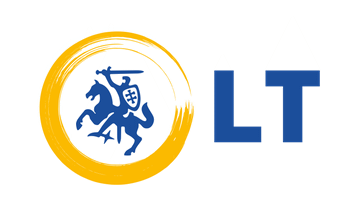
image by
Tomislav Todorovic, 23 March 2024
Freedom and Justice (/Laisvė ir teisingumas/) was founded in 2020 by merger of the Lithuanian Freedom Union (Liberals) (/Lietuvos Laisvės Sąjunga (Liberalai); LLS/) and the Order and Justice (/Tvarka ir teisingumas/) [1, 2]. The party considers itself the continuation of the first of its two founding components, as is visible from its logo, which is derived from that of the LLS: the stylized representation of the horseman from the national arms in very dark blue, surrounded with a circular shape in dark yellow which looks as if made by a brush stroke; at the right-hand side of the device, the initials LT are inscribed in the same shade of blue, followed by the full name of the party inscribed in two rows in the same color [1]. On the flag, only the encircled depiction of the horseman and the initials appear, all on white field. While the currently available photos [3, 4] do not provide a complete view of the flag, the size and arrangement of visible charges suggest the ratio of about 3:5, the same as for the flag of LLS.
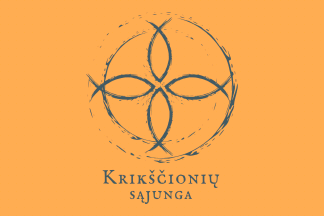
image by
Tomislav Todorovic, 23 March 2024
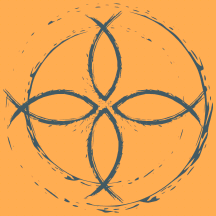
image by
Tomislav Todorovic, 23 March 2024
Christian Union (/Krikščionių sąjunga/) is a right-wing political party which was founded in 2020 [1]. Its flag is light orange, with the party emblem in gray [2]. The emblem consists of four fish symbols, arranged in a cross-like pattern (heads facing the center), with two incomplete circles, one painted around the fishes and the other over their tails, and the party name inscribed in two rows below; the fish symbols and the circles look as if painted by the brush, or even spray [1, 2]. While the currently available photos [2] do not provide a complete view of the flag, the size and arrangement of visible charges suggest the ratio of about 2:3.